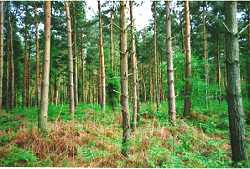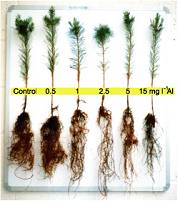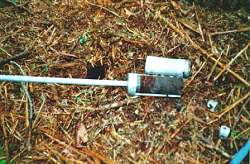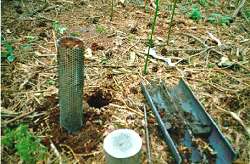Summary
 Headley Park field based study
Headley Park field based study
A field based study was carried out, investigating the effects of increased acid deposition on soil, soil solution chemistry and the fine roots of Pinus sylvestris growing on a podzol. An addition of sulphur at a rate of 15 Kg/ha/yr above ambient deposition was observed to:
- Reduce exchangeable Ca and Mg in the organic layer of the soil
- Increase total and free Al concentrations in the soil solution to levels which exceeded the critical threshold for healthy fine root growth
- Increase soil solution cation and anion concentrations
- Increased the ammonium:nitrate ratio in the soil solution of the rooting zone
- Significantly reduce root biomass and density in the organic and upper mineral horizons of the soil
- Have no effect on Al accumulation by the fine roots but decrease the Ca and Mg content of fine roots in the upper soil horizons.
The cause of the reduction in fine root growth was more likely to be cation depletion and high proton and ammonium concentrations due to the acidification treatment, rather than increased aluminium availability in isolation.
 The critical threshold of aluminium in solution for fine root functioning was identified between 2.5 and 5 mg/l. The aluminium threshold, was based on the inhibition effect of aluminium on fine root growth, nutrient status and seedling phosphorus uptake in controlled environment studies.
The critical threshold of aluminium in solution for fine root functioning was identified between 2.5 and 5 mg/l. The aluminium threshold, was based on the inhibition effect of aluminium on fine root growth, nutrient status and seedling phosphorus uptake in controlled environment studies.
The fine root response to the main soil-mediated factors (soil moisture, temperature and soil solution chemistry) and their fluctuation was also evaluated under natural environmental conditions. This study showed that:
- Soil moisture and soil solution chemistry have seasonal and year-to-year variations
- Fine roots of Pinus sylvestris may not be negatively affected by adverse soil conditions if soil moisture is not the limiting factor for root growth
- If soil moisture deficits are accompanied by an unfavourable soil chemical environment (high Al, low Ca:Al ratio), this may reduce fine root growth and increase mortality as well as alter the vertical distribution of the fine roots.
Acid deposition is one of the major anthropogenic factors affecting the stability of forest ecosystems. The increase in acid deposition has been associated with an increase in soil acidification and Al mobilisation in forest soils, which is believed to be a threat to forest vitality through its effects on fine roots. A direct effect of aluminium toxicity on fine roots was identified in a number of controlled environment experiments, but was not verified under field conditions. Aluminium toxicity is ameliorated by calcium, and the soil solution calcium to aluminium (Ca:Al) ratio was proposed as a better indicator for evaluating aluminium toxicity. Tissue Ca/Al molar ratio was also postulated as a better indicator than aluminium alone.


Future work
- Evaluate the most appropriate method for determining fine root biomass and turnover
- Establish a fine root sampling scheme in selected Level II plots
- Investigate the relationships between site conditions and vertical rooting pattern and distribution
- Investigate relationships between soil chemistry, tree health (crown condition, foliage chemistry, needle retention) and fine root chemistry and biomass
- Test the use of root nutrient elemental ratios as indicators of stress.
The results will show if fine root data can complement soil and foliage indicators in evaluating site conditions and environmental change.
There is now a European Concerted Research Action designated as COST E38 on “Woody root processes under changing environment” with three working groups discussing:
- Roots as indicators of environmental change
- Fine root dynamics
- Modelling of course root structures.
General Content
What’s of interest
Soil acidification and fine root response of Scots pine
Vanguelova, E.I. (2002).
Unpublished PhD thesis, The University of Reading, UK.
